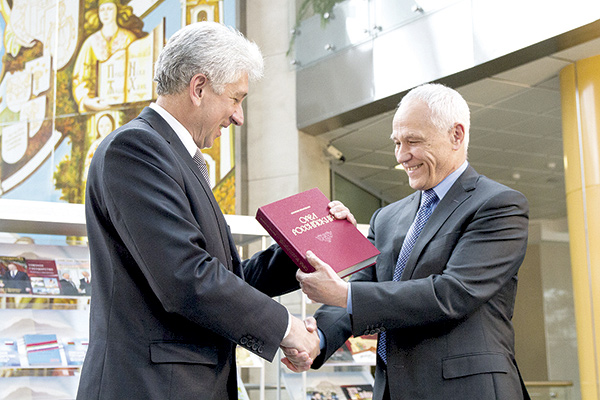The Union State Standing Committee and the National Library of Belarus develop joint projects
Recently, the National Library of Belarus celebrated its tenth anniversary in the new building. The library, renowned for its unique architectural design resembling a crystalline structure, is referred to by locals as ‘the diamond of knowledge’, and has become a Minsk tourist attraction.

The anniversary eve marked another important milestone: the signing of the cooperation agreement between the Union State Standing Committee and the National Library of Belarus.
The Committee has a long-standing friendship with the main Belarusian library, solidified by the fact that the State Secretary of the Union State, Grigory Rapota is a great appreciator of books and is interested in preserving their history. A few years ago he presented the National Library with a unique facsimile edition of Pushkin, consisting of three volumes of works written during the so-called Boldino autumn. Mr. Rapota said that the idea to make the manuscripts of the great poet available for study came to him when he visited the Pushkin House in St. Petersburg. His idea was enthusiastically received by both Belarusian and Russian communities.
The signing of the Agreement was honoured with gifts to the library funds: facsimile editions of several works written by Simeon Polotsky. Grigory Rapota astutely observed that Simeon as a literary figure could be seen as a symbol of intersection between Belarusian and Russian cultures.
Director of the National Library Roman Motulsky spoke on issues of mutual concern to the library and the Union State. He stated the most important and far-reaching project is the creation of a unified Eurasian library system. Acknowledgements were made to the Standing Committee for the ongoing contributions to library funds of editions documenting the Committee’s activities.
This contribution is featuring in the library’s current exhibition: ‘The Union State of Belarus and Russia’. Included in the public display are fifty editions from compilations of legal documents, books on historical links between the Belarusian and Russian nations and travel guides featuring ancient Slavic cities such as Polotsk, Smolensk, Rzhev and Slutsk.
Another important joint project is the creation of the digital library for the Union State.
The signing ceremony was followed by a ‘roundtable’ devoted to the five hundredth anniversary of the Belarusian and East Slavic printing, and the heritage of Simeon Polotsky and Frantsisk Skorina. Both figures are honoured throughout the Slavic space.
“It is not by chance,” states the Minister of Information, Lilia Ananich, “that under the auspices of the ‘Minsk initiatives’, the best books of Skoriniana edited in Belarus will be transferred to libraries of the neighbouring countries. And certain projects to memorialise Skorina and celebrate the anniversary of Belarusian printing will be supported by the Standing Committee of the Union State.”
“What a sacred place Polotsk is; how many genius people were born there!” Grigory Rapota remarked.
Apart from Frantsisk Skorina’s books, to be released in twenty-two volumes, the National Library of Belarus releases other rare facsimile editions, that are deemed culturally valuable to both nations. Among them is the ABC Dictionary of 1767, edited by Orthodox brothers in Vilno. It should be noted that this very book was presented to Grigory Rapota by Roman Motulsky at the agreement signing ceremony. The Turov Gospel and the Polotsk Gospel are sacred books for the entire Slavic world. Now, they can become joint projects.
A joint project nurturing new and contemporary writers has also breathed fresh life into the current library collection. Last year, many talented young literati from both Belarus and Russia attended an awards ceremony, held here in ‘the diamond of knowledge”. Jointly initiated by the Union State Standing Committee and the National Library, ‘The Friendship Bridge’ was conceived to acknowledge, encourage and publish current and emerging writers.
Submissions from the competition were edited together by the Union State Standing Committee into a substantial literary almanac, 350 pages in length. This was then distributed amongst Belarusian and Russian libraries.
Due to the outstanding success of this initiative, more joint projects are anticipated in the future.
By Lyudmila Ivanovа











